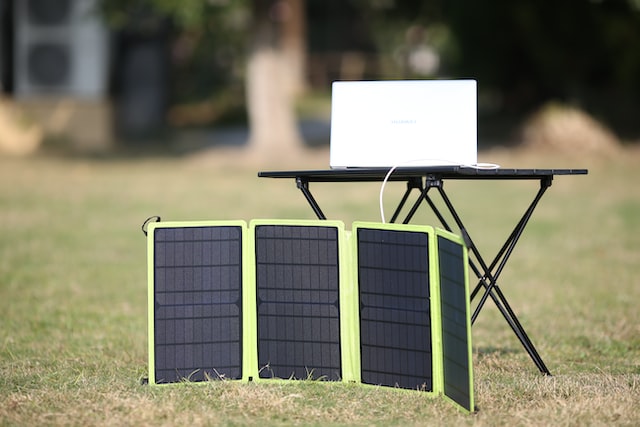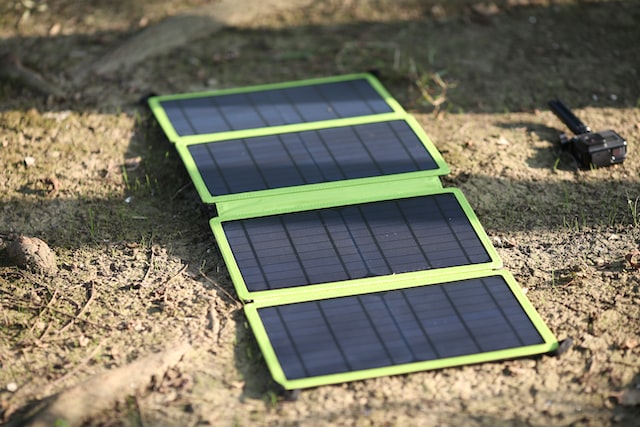
best size solar panel for camping
There are many factors to consider, including your battery capacity, cell type, and how much power you need to charge. This guide will take you through all these considerations and help you decide which size solar panels suit your needs. Best size solar panel for camping to consider before purchasing one:
appliance like a fridge or air conditioner needs more electricity than small LED lights.
Electricity is measured in watts. A watt is a rate at which energy is used or generated. The larger the appliance, the more watts it will use. For example, your refrigerator may use 600 watts of power per hour to run its compressor and other devices inside. If you want to run an air conditioner for four hours each day on a camping trip that lasts five days, you’ll need about 2200 total watts (600 x 4 x 5). By pairing two 300-watt solar panels together or choosing one 600-watt panel instead.
You can figure out what things you will use and then calculate the wattage needed for each.
There are several ways to calculate the power you need for your campsite. The simplest way is to add up all the wattages from each appliance you plan to use and then multiply that by the number of hours you’ll use them daily. For example, let’s say you have a coffee maker that uses 1000 watts and an electric hair dryer that uses 1400 watts. Your total power requirement would be 1000+1400=2400 watts/day or 24kW/day (24 kilowatts).
Here’s where things get more complicated: In most cases, solar panels don’t output their total rated capacity at all times. They only produce up to 90% capacity during sunlight hours and can fall below 50% during overcast days or at night (when most people aren’t using much energy). So if we want our calculations to be accurate when it comes time to buy a solar panel system, we need some additional information like average daily sunshine hours (which are available online)
You can find out the wattage of an appliance in various places, including the manual.
If you’re unsure how powerful your appliance is, there are several ways to find out.
- The most obvious way is to check the manual or nameplate (the label on the back of an appliance that lists its specifications).
- You can also use these resources: [Wattage Calculators](https://www.howtogetrunning.com/camping-solar/)
- Solar Panels for Powering Your RV (https://www.lifesure.co.uk/articles/a-guide-to-solar-panels-for-caravans-and-motorhomes).
Often a device will also have its wattage listed on the back of it.
If there’s a wattage listed on the back of your device, then you can use that to help determine how much energy it uses. However, it’s not always there—and if it isn’t, don’t worry! You can still figure out how much power your device needs by looking at its manual or searching online for the model number.
For example, I’m camping with my friends, and we want to watch movies outside at night. We have an old projector used for years and know that our projector has a brightness of 100 lumens but never thought about how many watts this meant in terms of power usage until now! Suppose I look on Amazon and research similar projectors from other brands (or even look up “100-lumen projector”). In that case, I’ll find that most projectors around this size are between 150-200 watts per hour when running off their internal battery alone.
Adding up these numbers will give you your minimum electrical requirement in watts.
Now, let’s add up the wattage of each device to get your minimum electrical requirement in watts. First, you need the wattage of each device. The best way to find this is by looking at the product itself or searching online if you don’t have it handy.
You can also use a calculator like this: https://www.elephantenergy.org/wattage-calculator/ If you are using a battery as well, be sure to add that in by multiplying its amp hours by 12 (amperes per hour). Multiply these numbers together for the total watts required for your campsite setup!
Look for solar panels that are at least this size and preferably larger.
- Calculate the wattage of the devices you’ll be powering. If you have an energy-hungry appliance, like a fridge or air conditioner, your solar panel needs to be large enough to provide sufficient electricity for these devices. You can determine how much power each device consumes by looking at its label or online specifications.
- Get a power meter to measure battery voltage and current draw. That will help you figure out if everything is working as expected and whether you need to make changes in the placement of panels or equipment so that they are better aligned with the sun’s path across the sky during daylight hours.
- Read More: The Best Portable Solar Panels
- Read More: Best Portable Solar Charger
- Read More: The Best Portable Power Stations
Know what appliances you plan to use, then calculate how much energy they need before choosing a solar panel
Before choosing a solar panel, you need to know what appliances you plan to use and how much energy they require. If the solar panel can’t provide that energy, it won’t be able to keep your gadgets charged.
Here are some things to consider:
- How many hours per day will the sunshine? If plenty of direct sunlight is available during daylight hours, a larger panel may not be necessary because it won’t need to work as hard throughout the day. On the other hand, if there isn’t much direct sunlight throughout most days, choosing a more extensive unit could help compensate for the lost time when clouds pass over or night falls.
- What type of appliances do I want to use? Some devices—like televisions and laptops—are very power-hungry compared with other electronics like simple flashlights or cell phones that only need small amounts of electricity for charging purposes (a few watts each).
Conclusion
Using this method, you can ensure enough space for the solar panel and battery to work together. It is important to remember that a more extensive system will take longer to charge than a smaller one, so if you want your batteries charged quickly, then choose something more powerful.
Read More: BEST SCOUT CAMPING GADGETS TO PACK ON YOUR NEXT TRIP
Chipjourney.com is a participant in the Amazon Services LLC Associates Program. An affiliate advertising program designed to provide a means for sites to earn advertising fees by advertising and linking to amazon.com.
